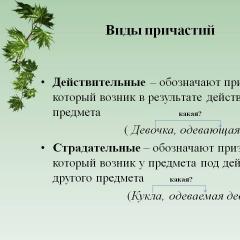Proper spelling: What is the sacrament and verbality, the rules with examples
In Russian, there are special parts of speech adjacent to a noun or verb. Some lingules consider them by special verb forms and explain this presence of similar signs.
In contact with
Morphological features
Consider in detail what is the Communion and Temploy. More ancient grammar noted their duality, so they gave them a name that means "involvement" to the name of a noun, or verb.
Participle
It is inclined, that is, it changes in childbirth, numbers, cases, has a brief and complete form. At the same time, it is inherent in the verb properties. For example, the presence of the form:
- checking notebook (imperpose) is the one who checks (what does?);
- checked (perfect view) - the one who checked (what did you do?).
Moreover The value of time.This is a permanent sign of data having a form or of this Time (creating), or past (Built). There is also a return form (recognized sia).
It is characterized by the presence of two pledges - the suffering and valid. Padding communities Indicate a sign of an object experiencing an action (received parcel - received a parcel). The actual reflects the symptom of the subject, independently producing the action (the running person is the one who runs himself).
From all of the above, it follows the conclusion: this part of the speech denotes a sign of the subject by the action manifested in time.
Tempecios
The term appeared in the 18th century, is " relationships to action", What does the first part of the word" delay "indicate (leader, act). In modern grammar, such a name has a part of speech denoting available action In relation to the main, pronounced verb. Therefore, this form is inherent verb signs:
- view perfect (opening) imperfect (closing);
- return (Pretending sch).
Perhaps this is limited to the similarity of the parts of the speech in question, but there are numerous differences.
What is the difference
First of all, it should be noted that it does not change, that is, not inclined and does not hide. Therefore in his morphem composition No flexy. On the contrary, the endings of the communities are their distinctive feature.
Discern these verb forms will help the questions they answer:
- Full sacrament (what (one; -th, -th)?); Brief (what (s; -o, -s)?).
- Tempecios (What making? What made? How? How?).
Another difference is a different syntactic role. Tempecility performs the function of circumstances (bent, loop, in the distance of the river.). Brief communionit is only a bit (opened doors to the world of beautiful dreams.). Full can be:
- definition (foaming waves were broken about high, impregnable rocks.);
- part of the composite nominal fag (bread was moldy).

Suffixes
The formation of communion and verbalism occurs under the suffix.
Tempecism is formed from the verbs of the corresponding species. Table 1.
| View | Suffixes | Examples |
| Perfect | -It, -t, -h | Throwing, bent, savings |
| Imperfect | -and I); - Wechi (outdated forms) | Counting, stealing |
It is the suffixes of communion and verdicts indicate the belonging of words to a particular part of speech.
Important! When forming the forms of the perfect species, suffixes are not used -, ", incorrectly use: Looking for correct: Looking.
Tempecistry are not formed from the following verbs of an imperfect look:
- ending on to-(take care, burn oven and others);
- having suffix -nu- (pull, go out, shout and others);
- run, prick, climb, plow, want, beat, vite, drink, eat, pour, angry, sew, tear, wait, bending, sleep, lie.
The condition of the correct choice of vowels in the suffixes of the communities of the present - knowledge of the rigging of verbs. Table 2.
note! Paddative communities are formed only from transient verbs. There are no forms of the present time at the verbs: protect, shave, wake, call, write, drink.
Table 3.
Table 4.
The choice of vowel before -H (H) is determined by infinitive suffix:
Spelling with ne.
Both parts of the speech are written with NOT Dlya, if not used without it, for example: non-love, hate.
In other cases, leadingness with not written is always separately separate, except for words with the prefix that has a meaning "less than is supposed", "poor-quality", for example - in not sawing after the child. Compare: without watching a movie, that is, without finishing the movie.
"Not" particle It should be written separately with a brief form of communities (not embroidered), as well as with complete in the presence of explanatory words (not published in time Roman), denial (far, at all, never, at all, whit and others) or opposition (not started, and finished) .

Use of one and two letters "H"
Doubted letter In the suffixes of complete communities are written if available:
- prefix: beveled, cooked (but: uninvited guest);
- dependent words: steamed in the oven;
- sufifixes -OV-, -Ev-, -Yova-: Canned, delighted;
- the word is formed from the verb of the perfect species without a console (exception: wounded): deprived.
At the end of the brief forms, it is always written alone -: based, unpacked.
Sealing syntactically designs
Often it is observed punctuation error - incorrectly arranged punctuation marks in suggestions containing particle prudes and involvement. The reason lies in the inability to distinguish them from each other, to determine the boundaries of these structures, find the word to which they relate.
Find out under what conditions it is allocated partly accompany and involvement. We give existing rules in the language with examples.
Participial
Explains the noun or pronoun, is the definition, is isolated if:
- refers to the personal: Lauginated by the gentle words of the mother, he slept tightly. I, who knows each path in the surrounding area, was appointed senior interlocks.
- it stands after the noun: soldiers, stunned by a projectile, fell on the battlefield.
- it has the circumstantial value of the cause or concession: tired after a long road, tourists continued the way. Tourists continued the way (despite what?), Although they tired after a long road. Granted by themselves, the children were in a difficult position.
Children were in a difficult position (why?), Since they are provided to themselves.

Participial turnover
Indicates the additional effect of the verb-fag, is a circumstance, it is always separate: the shimmer waves, the sea raged. The old man walked, laughing on one leg.
Important! The exceptions are the turnovers that have passed into the category of stable expressions, somehow: Having burned the breath, having broken his head, having dried the tongue, after the sleeves.
Compare two suggestions:
- Tonging the language, the dog breathed heavily (the dog snapped the tongue).
- The boy rushed to hang out tongue (ran quickly).
In the first case, in the sentence there is a perpetrator. In the second, the expression "hanging out the language" is figuratively. It is easily replaced by one word, adorption "quickly", therefore, is not separated.
Common grammatical errors
The most common mistake is the wrong agreement between the sacrificment with the explanable word, caused by the inability to determine it correctly. This can be observed in the following example:
Tikhon was a haired man, fully submitted to his mother - Kabanchi.
The writing asked the question from the word Tikhon, although the Communion "obeying" explains another word - "man." The correct option sounds like this:
Tikhon was a hazard man (what?), Fully submitted to his mother - Kabani.
Often confused by the suffering and valid communion:
Among lottery tickets was won.
From the written it turns out: the ticket won, although the thought is different: the ticket won, therefore, we use the word won.
When used, it is important to take into account that both actions, the main and added, should refer to one person. If this is not done, we get similar phrases: bending the depth of spiritual values, the hero has changed the worldview.
The adding action, expressed by the hero, applies not to the hero, which produces an action, but by the word "worldview".
The correct option: bending the depth of the spiritual values \u200b\u200bof the people, the hero changed its worldview.
For the same reason, it is impossible to use this part of speech in impersonal proposals that transmit state, and not an action: deceiving mom, the children became bad.
Communion and Templocoming: What is the difference? Involved and verbal turnover - a simple explanation
Participial
Output
The speech of the educated person is impossible to imagine without verb forms. The first help to explore, comprehensively characterize the subject. The second make it possible to simplify speech, replace a number of homogeneous fags denoting not the main action, but the secondary, additive. If you learn to understand in the designers, you can make your speech beautiful, bright, understandable, which is important for achieving success in life.


